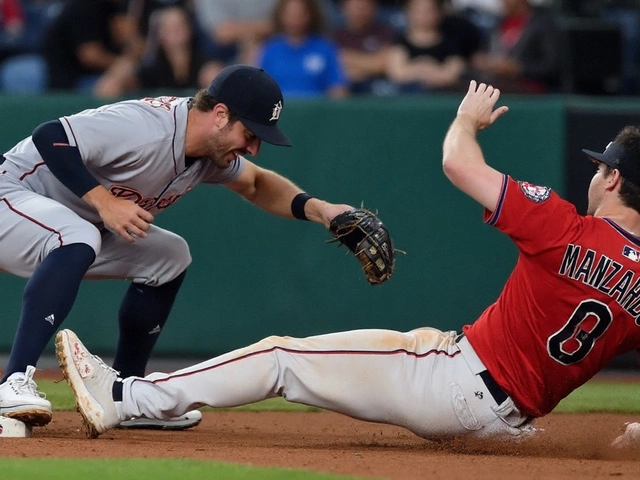With their Champions League fate hanging by a thread, Niko Kovac has issued a blunt ultimatum to Borussia Dortmund: win or else. The 54-year-old Croatian manager made it clear after Monday’s press conference that Tuesday’s home clash against Villarreal CF at Signal Iduna Park isn’t just another match—it’s a lifeline. Kickoff is set for 9:00 PM CET on November 26, 2025, and with Dortmund languishing in 14th place—just one point ahead of Villarreal’s 32nd—the pressure isn’t just tactical, it’s existential.
What’s at Stake?
Dortmund’s Champions League campaign has unraveled in shocking fashion. After opening with wins over Athletic Club and Copenhagen, they’ve since drawn with Juventus and lost to Manchester City. Seven points from four games leaves them just two behind Liverpool in eighth—the cutoff for automatic round-of-16 qualification. But here’s the twist: finish 14th and you still get a playoff shot. Finish 15th or worse? You’re out. Villarreal, meanwhile, are the ultimate underdogs: third in La Liga, but winless in three Champions League matches, with only a 2-2 draw against Juventus to show for their efforts. Their 3-1 loss to FC Pafos from Cyprus? A humiliation that still echoes.
The Defensive Crisis
The numbers don’t lie. In their last three games across all competitions, Dortmund have conceded eight goals—including two stoppage-time equalizers in as many weeks. Saturday’s 3-3 draw with VfB Stuttgart was the final straw. Leading 3-2 in the 89th minute, they collapsed. Kovac didn’t mince words: "We weren’t present for the first 25 minutes. VfB dominated. And after halftime? It didn’t help us." Goalkeeper Gregor Kobel, the 27-year-old Swiss international, summed up the mood: "We now need to talk about fundamental things." That’s code for: the backline is broken. The midfield offers no protection. The fullbacks are exposed. And Kovac’s response? "Defend like there’s no tomorrow."
Missing Pieces and Tactical Shifts
Compounding the problems is the absence of 22-year-old midfielder Maximilian Beier. He trained briefly on Monday but was withdrawn after muscle discomfort from Saturday’s game. "At the moment, it looks like he unfortunately won’t be available tomorrow," Kovac confirmed. Beier’s energy and pressing ability were crucial in breaking up opposition transitions—something Dortmund desperately need against Villarreal’s quick, technical forwards. Kovac admitted the squad will need rotation: "We have many healthy players. But the next few weeks are brutal. We’ll have to be smart." That means likely giving minutes to youngsters like 19-year-old Youssoufa Moukoko or veteran Julian Brandt, who’s been out since September with injury.
Villarreal: The Quiet Threat
Don’t be fooled by their lowly Champions League standing. Kovac knows better. "The fact that they are there means they’re performing really well," he said, referencing Villarreal’s La Liga position. Their players, he noted, are "technically very skilled, very fast, with a very good transition game." Their draw against Juventus proved they can control possession. Their loss to Pafos? An aberration, not a pattern. And with nothing to lose, they’ll come to Dortmund hungry. "They haven’t achieved what they could have," Kovac added. "That doesn’t make things easier—it makes them more dangerous."
Is This a Crisis? The Players Respond
Kovac rejected the "rock bottom" label: "We’re certainly not at rock bottom." But he didn’t deny the mess: "We have to change a lot." Defender Waldemar Anton offered a counterpoint: "We shouldn’t make a big drama out of this. We’ll show a different face in the coming weeks. We’re stable enough to turn things around." That’s the tension right now—between realism and hope. The team has played six of seven games away. Now, finally, they’re home. And as Kobel put it: "We have a great chance to put ourselves in a fantastic position with the support of our home fans. That’s an opportunity we want to seize one hundred percent."
What Comes Next?
If Dortmund win, they jump to 10 points—potentially leapfrogging Napoli (4 points) and even Atalanta (8 points) into the top 12. A draw? They stay at 8, still in the playoff zone but vulnerable. A loss? They’re suddenly in danger of slipping below 14th, especially if rivals like Lazio or Feyenoord win. The next fixture? A home game against Copenhagen on December 10. Then a trip to Juventus on December 17. Every point matters. And Tuesday night? It’s the first domino.
Behind the Scenes: Fábio Silva’s Future
Amid all this, rumors swirl about Portuguese forward Fábio Silva. The 23-year-old, once a €40 million signing from FC Porto, has been a shadow of his former self. He’s started just once in the league this season. Sources say clubs in Portugal and Saudi Arabia are circling. Kovac offered no specifics but hinted at rotation strategy: "We have to manage every player’s load." Whether Silva plays Tuesday—or ever again for Dortmund—is now a question hanging over the entire club.
Frequently Asked Questions
What does Dortmund need to qualify for the Champions League round of 16?
Dortmund must finish in the top eight of the 36-team league phase to qualify automatically. Currently, Liverpool holds eighth with nine points. Dortmund has seven, so they need at least one more point to stay in contention. A win against Villarreal would take them to 10 points—putting them within striking distance of the top eight. Finishing 9th–14th still grants a playoff berth, but 15th or worse means elimination.
Why is Villarreal considered dangerous despite their poor Champions League record?
Villarreal sit third in La Liga, behind only Real Madrid and Barcelona, proving their squad’s quality. Their Champions League struggles stem from inconsistent performances and bad luck, not lack of talent. They’ve drawn with Juventus and only lost to Pafos—a rare anomaly. Their fast transitions and technical midfielders, like Dani Parejo and Arnaut Danjuma, can exploit Dortmund’s defensive gaps. Kovac knows they’re not the team their standings suggest.
How has Gregor Kobel’s performance been affected by the team’s defensive issues?
Kobel has made several crucial saves this season, but he’s been left exposed too often. In the last three games, he’s faced 31 shots on target—11 more than his season average. His save percentage has dropped from 82% to 67% in the last four matches. The problem isn’t him—it’s the lack of cover from midfield and fullbacks. His comments about "fundamental things" reflect his frustration with systemic breakdowns, not personal failure.
What’s the significance of playing at Signal Iduna Park for Dortmund’s morale?
Dortmund have won 8 of their last 10 home Champions League matches. The Yellow Wall, with over 80,000 fans, creates one of Europe’s loudest atmospheres. Historically, this stadium turns around struggling teams—like in 2022, when they overturned a 3-1 deficit against Real Madrid. Kovac knows this is their best chance to spark a turnaround. The crowd’s energy could be the difference between a 1-1 draw and a 3-0 win.
Could Niko Kovac lose his job if Dortmund fail to advance?
Not immediately. Kovac’s contract runs through 2027, and the club’s board has publicly backed him despite the slump. But if they exit the Champions League and fall out of the top four in the Bundesliga, pressure will mount. His track record—winning the German Cup with Eintracht Frankfurt and managing Bayern Munich—is respected. Still, Dortmund’s expectations are elite. Another early exit would force serious reevaluation, especially with young talents like Moukoko and Bellingham’s successor emerging.
What’s the impact of Maximilian Beier’s absence on Dortmund’s midfield?
Beier’s absence leaves a void in pressing intensity and ball recovery. He averages 4.3 tackles per game—highest on the team. Without him, the midfield becomes passive, allowing opponents to dictate tempo. Kovac may shift to a 4-2-3-1 with Jude Bellingham dropping deeper, or give 18-year-old Julian Ryerson his first start. Either way, the team loses its most energetic shield in front of the backline.





Write a comment